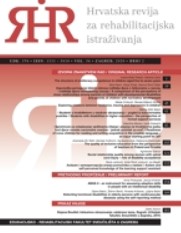AUTIZAM I SAMOPERCEPCIJA ZNANJA POMOĆNIKA U NASTAVI
AUTISM AND SELF-PERCEIVED KNOWLEDGE OF THE LEARNING SUPPORT ASSISTANTS
Author(s): Denis Jurković, Anita Penić Jurković, Iva MaglićSubject(s): Educational Psychology, Psychology of Self, Demography and human biology, Inclusive Education / Inclusion, Sociology of Education
Published by: Sveučilište u Zagrebu, Edukacijsko-rehabilitacijski fakultet
Keywords: learning support assistant; self-perceived knowledge; inclusion; autism; training;
Summary/Abstract: The aim of this e-research carried out in the school year 2019/2020, on a sample of 425 learning support assistants, was to establish the level of self-perceived knowledge about inclusion and working with students with autism among learning support assistants. The aim of the research was also to establish which of the socio-demographic indicators contribute to self-perceived knowledge about working with students with autism, but also to inclusion in general. The Questionnaire on the Self-Perceived Knowledge on Inclusion and Autism (SZIA), which consists of two subscales, was designed for the purposes of this research. The first subscale, Self-perceived specific knowledge on autism, measures self-perceived knowledge on working with students with autism; while the other subscale, Self-perceived general knowledge on inclusion, measures self-perceived knowledge of the learning support assistant on inclusion in general. A socio-demographic questionnaire was also compiled by which other data on research participants were collected. According to the obtained results, self-perceived knowledge about working with students with autism showed a statistically significant positive relationship with the initial motive for working with those students. Completion of training for becoming a learning support assistant and experience in working with those students showed a significant negative relationship with self-perceived knowledge about working with students with autism. However, neither motive, training nor experience played an essential role in self-perceived knowledge about inclusion. Also, there were statistically significant differences among study participants in self-perceived knowledge about working with students with autism. This applies in particular to the initial motive for work, completed training for learning support assistant and the experience of working with students with autism, while years of work as an assistant did not make a statistically significant difference. Finally, self-perceived knowledge on inclusion was shown to contribute statistically significantly to self-perceived knowledge of working with students with autism. This kind of research has great potential for gaining a better insight into the knowledge and competencies of assistants, and thus the quality of their work.
Journal: Hrvatska revija za rehabilitacijska istraživanja
- Issue Year: 56/2020
- Issue No: 2
- Page Range: 132-153
- Page Count: 22
- Language: English, Croatian

